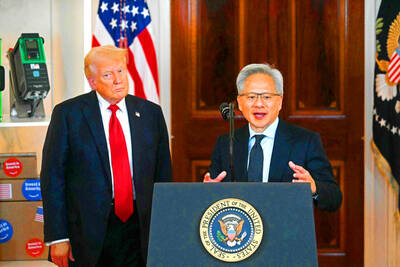Intel Corp, the world's biggest maker of chips and chipsets, and rival Via Technologies Inc (
Financial terms weren't disclosed. The rivals signed a 10-year agreement to license each other's products and Intel agreed not to assert its patents on some microprocessors for three years, the companies said. Intel gave Taiwan-based Via a four-year license to design and sell chipsets compatible with Intel microprocessors. Intel will get some royalties.
The settlement opens a larger market for Via, though it also may force the company to raise prices on chipsets and microprocessors, said Kevin Krewell, an analyst at MicroDesign Resources who doesn't own shares of Via or Intel.
"It's a double-edge sword for Via," Krewell said. "Any money they're paying Intel for licensing will cut into their margins and may force them to raise their prices slightly."
An appeals court in February denied Santa Clara, California-based Intel a new trial in one suit against Via. Intel and Via were involved in as many as 11 suits over 27 patents in Texas, California, China, Hong Kong, the UK, Germany and Taiwan.
"This clears everything," Intel spokesman Chuck Mulloy said.
Via's sales in the first quarter this year fell by 22 percent to NT$5.7 billion (US$163.6 million) compared with the same period a year ago, based on monthly revenue reports from the company.
Via's profit in the third quarter last year, the most recent period in which the company posted earnings, tumbled to NT$44 million from NT$882 million in the year earlier period. Via's net income fell in each of the first three quarters last year.
Prices for chipsets, which work with processors in a computer to control graphics and memory, have plunged as demand for personal computers have ebbed.
Intel shares rose US$0.30 to US$17.35 on the Nasdaq Stock Market. Via shares rose NT$2.30 to NT$36 in Taipei. The settlement was announced after the close of regular U.S. trading.
Intel first sued Via in September 2001, alleging infringement of patents in microprocessor and chipset products. Via countersued, saying Intel's microprocessors infringed three patents Via acquired through an acquisition of Centaur.

Taiwan Semiconductor Manufacturing Co (TSMC, 台積電) last week recorded an increase in the number of shareholders to the highest in almost eight months, despite its share price falling 3.38 percent from the previous week, Taiwan Stock Exchange data released on Saturday showed. As of Friday, TSMC had 1.88 million shareholders, the most since the week of April 25 and an increase of 31,870 from the previous week, the data showed. The number of shareholders jumped despite a drop of NT$50 (US$1.59), or 3.38 percent, in TSMC’s share price from a week earlier to NT$1,430, as investors took profits from their earlier gains

AI TALENT: No financial details were released about the deal, in which top Groq executives, including its CEO, would join Nvidia to help advance the technology Nvidia Corp has agreed to a licensing deal with artificial intelligence (AI) start-up Groq, furthering its investments in companies connected to the AI boom and gaining the right to add a new type of technology to its products. The world’s largest publicly traded company has paid for the right to use Groq’s technology and is to integrate its chip design into future products. Some of the start-up’s executives are leaving to join Nvidia to help with that effort, the companies said. Groq would continue as an independent company with a new chief executive, it said on Wednesday in a post on its Web

CHINA RIVAL: The chips are positioned to compete with Nvidia’s Hopper and Blackwell products and would enable clusters connecting more than 100,000 chips Moore Threads Technology Co (摩爾線程) introduced a new generation of chips aimed at reducing artificial intelligence (AI) developers’ dependence on Nvidia Corp’s hardware, just weeks after pulling off one of the most successful Chinese initial public offerings (IPOs) in years. “These products will significantly enhance world-class computing speed and capabilities that all developers aspire to,” Moore Threads CEO Zhang Jianzhong (張建中), a former Nvidia executive, said on Saturday at a company event in Beijing. “We hope they can meet the needs of more developers in China so that you no longer need to wait for advanced foreign products.” Chinese chipmakers are in

POLICY REVERSAL: The decision to allow sales of Nvidia’s H200 chips to China came after years of tightening controls and has drawn objections among some Republicans US House Republicans are calling for arms-sale-style congressional oversight of artificial intelligence (AI) chip exports as US President Donald Trump’s administration moves to approve licenses for Nvidia Corp to ship its H200 processor to China. US Representative Brian Mast, the Republican chairman of the US House Committee on Foreign Affairs, which oversees export controls, on Friday introduced a bill dubbed the AI Overwatch Act that would require the US Congress to be notified of AI chips sales to adversaries. Any processors equal to or higher in capabilities than Nvidia’s H20 would be subject to oversight, the draft bill says. Lawmakers would have